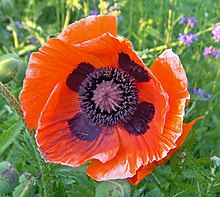Papaver orientale
| Oriental poppy | |
|---|---|
 |
|
| Scientific classification | |
| Kingdom: | Plantae |
| (unranked): | Angiosperms |
| (unranked): | Eudicots |
| Order: | Ranunculales |
| Family: | Papaveraceae |
| Genus: | Papaver |
| Species: | P. orientale |
| Binomial name | |
|
Papaver orientale (L. ) |
|
Papaver orientale (Oriental poppy) is a perennial flowering plant native to the Caucasus, northeastern Turkey, and northern Iran.
Oriental poppies grow a mound of leaves that are hairy and finely dissected in spring. They gather energy and bloom in mid-summer. After flowering the foliage dies away entirely, a property that allows their survival in the summer drought of Central Asia. Gardeners can place late-developing plants nearby to fill the developing gap.
Papaver orientale has a USDA hardiness zone of 3-8. It usually thrives in soil pH 6.5 to 7.5 and in full sun or part shade. Seeds are sown after the potential of frost has passed, the average temperature is approximately 21 °C and when soil has thoroughly warmed. The seeds are sown at a depth of about one centimeter, or less as light may stimulate germination. Oriental Poppies do not handle transplanting or over-watering well. Germination period is 10–20 days. Mulch can be used to protect the plant over the winter and cutting off the stem (deadheading) will produce a second flower.
Aside from its natural brilliant orange-scarlet, since the later 19th century selective breeding for gardens has created a range of colors from clean white with eggplant-black blotches (Barr's White is the standard against which other whites are measured), through clear true pinks and salmon pinks to deep maroons and plum. In addition petals may be creased or fringed, such as Türkenlouis.
Cultivars (those marked agm have gained the Royal Horticultural Society's Award of Garden Merit):-
Oriental poppies are closely related to the great scarlet poppy Papaver bracteatum, which can be grown for the commercial extraction of thebaine, a main source for the legal synthesis of opiates. Oriental poppies, however, do not produce any narcotic alkaloids such as morphine or codeine. Many garden Oriental poppies are actually hybrids between P. bracteatum and P. pseudo-orientale.
...
Wikipedia
